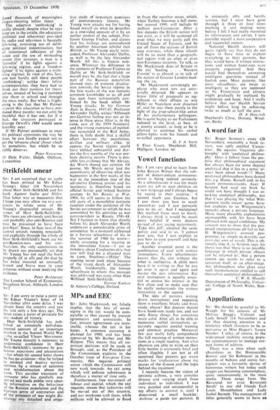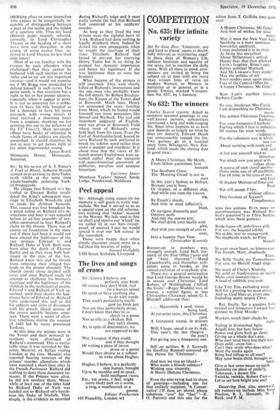Appellations
Sir: We should be grateful to Mr Waugh for his censure of Mr Melvyn Bragg's 'Colonel and Lady Sewell' (14 November) and for thus drawing, attention to a tendency which threatens to be as pervasive as Miss Hagen's 'Laura Nordcr'. I refer, of course, to the widespread inability among popu- lar communicators to manage cor- rect forms of address.
There was a time when such absurdities as 'the Honourable Brown' and 'Sir Robinson' in the mouths of baboos and comic for- eigners was a favourite device of humorous writers but today such
usages are becoming commonplace, quite unconsciously, in the mass media. These range from 'the Reverend (or even Reverent) Smith' to our old friends Earl
Louis Mountbatten and Lady Isobel Barnett. The management of titles generally seems to have an
inhibiting effect on some journalists who appear to be congenitally in- capable of distinguishing between a peer of the realm and the holder of a courtesy title. Thus my local (Bristol) paper recently referred, correctly, to Lord Christopher Thynne in the heading of a short news item and thereafter, in the course of some twelve lines, re- ferred to Lord Thynne no less than nine times!
Most of us are familiar with the excuses by such offenders when challenged—that they cannot be bothered with such niceties or that 'titles and so on' are not important anyway—and it would not surprise me if Mr Bragg now proceeded to defend himself in such terms. The point surely is that everyone has a right to his or her proper identity, especially when it appear in print. It is just as annoying for a noble- man to have his title bungled as for a dustman to have his name mis-spelt, with wrong initials (I once received a charming letter from a countess, thanking me for pointing this out in the columns of the TV Times!). Most newspaper offices have books of reference in which forms of address are clearly prescribed. It should therefore be Just as easy to get names right as (so often ingeniously) wrong.
James Brock Montacute House, Montacute, Somerset Sir: In his review of A. J. Potter's A Trail of Blood, Auberon Waugh seemed over-anxious to deny Tudor myth whilst at the same time whole-heartedly endorsing York- ist propaganda.
He alleges that Edward iv's be- trothal to Eleanor Butler invali- dated the King's subsequent mar- riage to Elizabeth Woodville and so made . his children bastards. This canard was first broadcast by a priest acting on Richard in's in- structions and later it was repeated before an ad hoc assembly of not- ables summoned to hear Richard's claim to the throne. There was of course no foundation in the story and if there had been it would not have altered the legitimacy of the two princes, Edward v and Richard. Duke of York. Both were born after the death of Eleanor Butler and sa they were both legi- timate in the eyes of the law. Richard knew this and he shrank from referring their alleged bas- tardy to the proper channels. The church courts alone decided such cases and since Richard made no attempt to challenge his brother's marriage and the legitimacy of his children in the ecclesiastical courts, Edward v and Richard of York re- mained. until their deaths the legi- timate heirs of Edward iv. Richard fully understood this and so did his subiects and siens of discontent with his grossly illeeal seizure of the crown quickly became anpa- rent. There were a series of abor- tive rebellions during the summer of 1483 led by many prominent York ists.
At this time the princes were in the Tower and their personal at- tendants were dismissed at Richard's command. This is irrefu- table since it was recorded by Do- minic Mancini. an Italian visiting London at the time. Mancini also reported hearing rumours of the princes' murder, allegations which were repeated a short time after in the French Parlement. Richard did nothing to deny these damaging ru- mours. If the Princes were alive, he did not produce them. Mean- while at least one of the titles held by Richard Duke of York was handed out to Richard III'S hench- man the Duke of Norfolk. This. simply, is the evidence as recorded
during Richard's reign and it must make certain the fact that Richard had connived at his nephews' murder.
As long as they lived the two princes were the rightful heirs of York. Richard had done nothing to legally disinherit them. Indeed he denied his own propaganda when he sought the marriage of their sister Elizabeth. Richard had hoped to prevent her marrying Henry Tudor but in so doing he pointed her dynastic importance and hence her legitimacy. If she was legitimate then so were her brothers.
What became of the princes is still uncertain. They were clearly killed at Richard's instructions and the one man who probably knew the full details, Sir Robert Bracken- bury, the Keeper of the Tower, died at Bosworth. Much later, Henry vu concocted the story, familiar from More, which he hoped would forestall any more pretenders like Simnel and Warbeck. The real and important judgment of English- men was given at Bosworth Field where most of Richard's army held back from his cause. Even the Earl of Northumberland, bound to serve Richard by oath, preferred to break his solemn word rather than assist a usurper and murderer. It is about time that the views of fif- teenth century Englishmen were ac- cepted rather than the romantic and quasi-historical guesswork of publicists, novelists and amateur historians.
Lawrence James Merchant Taylors' School, Sandy Lodge, Northwood, Middlesex







































 Previous page
Previous page